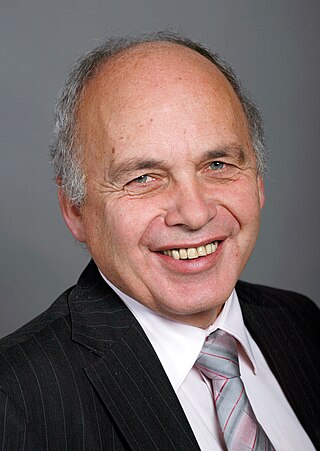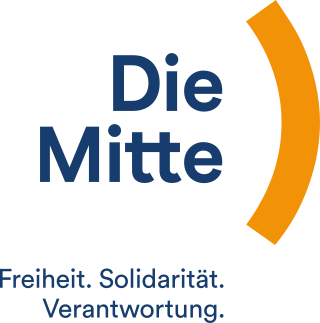
Ludwig von Moos was a Swiss politician and member of the Swiss Federal Council (1959–1971).

The Federal Council is the federal cabinet of the Swiss Confederation. Its seven members also serve as the collective head of state and government of Switzerland. Since after World War II, the Federal Council is by convention a permanent grand coalition government composed of representatives of the country's major parties and language regions.

The Social Democratic Party of Switzerland, or Swiss Socialist Party, is a political party in Switzerland. The SP has had two representatives on the Federal Council since 1960 and received the second-highest number of votes in the 2019 Swiss federal election.

Joseph Deiss is a Swiss economist and politician who served as a Member of the Swiss Federal Council from 1999 to 2006. A member of the Christian Democratic People's Party (CVP/PDC), he first headed the Federal Department of Foreign Affairs (1999–2002) before transferring to the Federal Department of Economic Affairs (2003–2006). Deiss was elected President of the United Nations General Assembly for its 65th session in 2010.

The Council of States is the upper house of the Federal Assembly, and the lower house being the National Council. It comprises 46 members.

The Christian Democratic People's Party of Switzerland, also called the Christian Democratic Party, Democratic People's Party and Swiss Christian Democratic Party, was a Christian-democratic political party in Switzerland. On 1 January 2021, it merged with the Conservative Democratic Party of Switzerland (BDP/PBD) to form The Centre, which now operates at the federal level. The Christian Democratic People's Party will continue to exist at the cantonal level as individual local and regional parties determine their status.

The Evangelical People's Party of Switzerland, Swiss Evangelical Party, or Evangelical Party of Switzerland is a Protestant Christian-democratic political party in Switzerland, active mainly in the Cantons of Bern, Basel-Land, Basel-Stadt, Aargau and Zürich. "Evangelical" translates as evangelisch, the German term for "Protestant", as opposed to "evangelical" as used in Anglo-Saxon Christianity.
The Christian Social Party (CSP) (German: Christlich-soziale Partei, French: Parti chrétien-social) is a political party in Switzerland of the Christian left. The CSP is more aligned with social democracy than the other major Christian party, the Christian Democratic People's Party of Switzerland (CVP), which is more economically liberal. With the moderate Christian left as its background, the CSP commits itself to social-democratic and environmentalist political solutions. The core principles of the CSP contain, among others, "solidarity with the socially and economically disadvantaged and the preservation of the environment."

The Federal Assembly, also Swiss parliament, is the federal bicameral legislature of Switzerland. The lower house is the 200-seat National Council and the upper house is the 46-seat Council of States. It meets in Bern in the Federal Palace.

Elections to the Swiss Federal Assembly, the federal parliament of Switzerland, were held on Sunday, 21 October 2007. In a few cantons, a second round of the elections to the Council of States was held on 11 November, 18 November, and 25 November 2007. For the 48th legislative term of the federal parliament (2007–2011), voters in 26 cantons elected all 200 members of the National Council as well as 43 out of 46 members of the Council of States. The other three members of the Council of States for that term of service were elected at an earlier date.
On December 12, 2007, all seven members of the Federal Council, the government of Switzerland, were elected by the joint chambers of the Federal Assembly for the 2008–2012 term of office. Councillors are elected individually by an absolute majority of votes, with the incumbent councillors defending their seats in descending order of seniority.

The Conservative Democratic Party of Switzerland was a conservative political party in Switzerland from 2008 to 2020. After the 2019 federal election, the BDP had three members in the National Council.

On 10 December 2008, the Swiss Federal Assembly elected Ueli Maurer as successor to Federal Councillor Samuel Schmid. Schmid resigned on 12 November 2008 after a number of controversies, officially citing health and personal reasons. Maurer took office on 1 January 2009.
The Christian Democrats/EVP/glp Group, abbreviated to CEg, was a centrist parliamentary group of three parties in Switzerland's federal legislature, the Federal Assembly, between 2007 and 2011.

The Centre or Alliance of the Centre is a centre-right political party in Switzerland. It was formed through the merger of the Christian Democratic People's Party of Switzerland (CVP/PDC) and the Conservative Democratic Party of Switzerland (BDP/PBD). Following the formal merger of the parties on 1 January 2021, it has 28 of 200 seats in the National Council and 13 of 46 seats in the Council of States. Viola Amherd is the party's representative on the Federal Council.
Neo – The Social-liberal Centre, known before 2023 as the Christian-social People's Party of Upper Valais is a Christian-social political party in the German-speaking areas of the Swiss canton of Valais, associated federally with The Centre.












